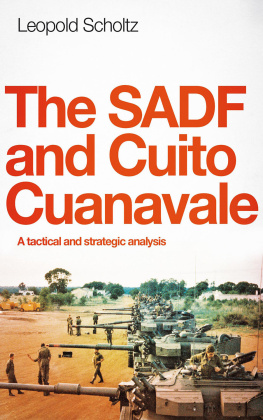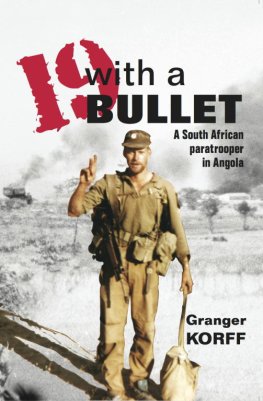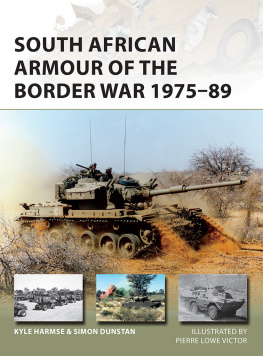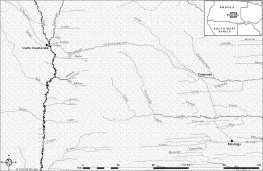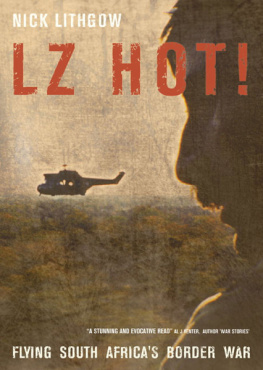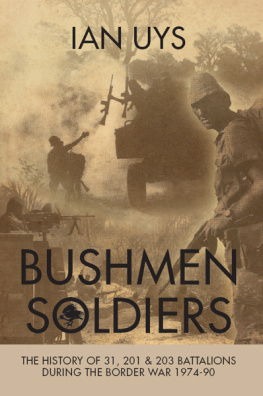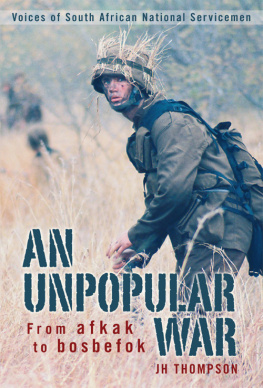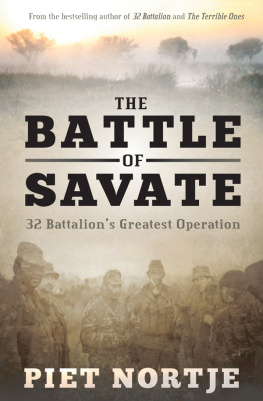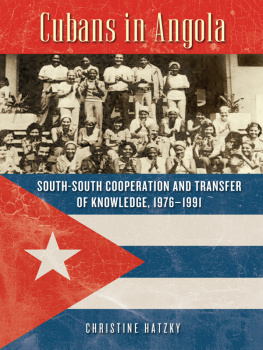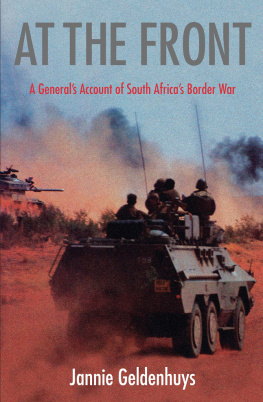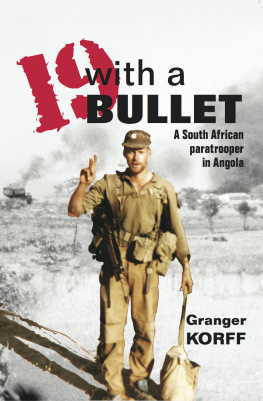The South African Defence Forces in the Border War 1966-1989 offers the first comprehensive analysis of the South African Defence Forces role in the Border War in Namibia and Angola since the end of this conflict in 1989. It investigates the causes of the Border War and follows its progress and escalation in the 1980s. It also considers the broader international context against which this conflict took place.
The author brings vital new information to light gained from documents which have since been declassified. This includes documents from the State Security Council, the department of foreign affairs, the SADF itself, as well as from the Cuban and Soviet governments. It sheds light on the objectives of the National Party government in both Angola and the former Southwest Africa, the SADFs strategy in the war and its cross-border operations in Angola.
To sketch as complete a picture as possible of individual operations, the author not only interviewed several high-ranking SADF officers, but also included information from the Cuban archives and testimonies of Cuban and Russian officers. All the major operations and battles are discussed, including Savannah, Reindeer, Sceptic, Protea and Modular, as well as the battles of Cassinga and Cuito Cuanavale.
Where a battle had no clear winner, the author asks what the aim was of each of the parties involved and whether they succeeded in achieving that goal. In this way, he offers fresh perspectives on long-running and often controversial debates, for instance on who won the battle of Cuito Cuanavale. In the last chapter, the author looks at the objectives of all the parties involved in the war and whether they achieved them. In the process he tries to answer the all-important question: Who won the Border War?
Dr Leopold Scholtz is a senior journalist, political commentator and a highly regarded military expert. He was deputy editor of Die Burger until 2007 and is currently the European correspondent for Media24s Afrikaans dailies.
Scholtz obtained his doctors degree from the University of Leiden and is currently a research fellow at the University of Stellenbosch. He has written four books and over 40 academic articles, most of which are about military history. He was a captain in the Reserve Force of the South African Army until recently.
His books include Beroemde Suid-Afrikaanse Krygsmanne, Generaal Christiaan de Wet as Veldheer and Waarom die Boere die oorlog verloor het.
THE SADF IN THE BORDER WAR 19661989
LEOPOLD SCHOLTZ
Helion & Company Limited
26 Willow Road
Solihull
West Midlands
B91 1UE
England
Tel. 0121 705 3393
Fax 0121 711 4075
Email:
Website: www.helion.co.uk
Twitter: @helionbooks
Visit our blog http://blog.helion.co.uk/
This edition published by Helion & Company 2015
South African edition published in 2013 by Tafelberg, an imprint of NB Publishers, a
Division of Media24 Boeke (Pty) Ltd, South Africa (www.tafelberg.com)
Cover design: Michiel Botha
Book design: Cheymaxim
Editing: Alfred LeMaitre
Proofreading: Lesley Hay-Whitton
Text Leopold Scholtz 2013
Maps Camille Burger
Photos Documentation Centre of the South African National Defence Force,
UWC-Robben Island Museum Mayibuye Archive, Roland de Vries
ISBN 978 1 909982 76 5
eISBN 978 1 913118 04 4
eMobi ISBN 978 1 913118 04 4
British Library Cataloguing-in-Publication Data.
A catalogue record for this book is available from the British Library.
All rights reserved. No part of this publication may be reproduced, stored in a retrieval system, or transmitted, in any form, or by any means, electronic, mechanical, photocopying, recording or otherwise, without the express written consent of Helion & Company Limited.
For details of other military history titles published by Helion & Company Limited contact the above address, or visit our website: http://www.helion.co.uk .
We always welcome receiving book proposals from prospective authors.
T O MY PARENTS
LIST OF MAPS
The operational area
The Battle of Cassinga
The attack on Chetequera
Operation Sceptic
Operation Protea
Battle of Xangongo
Battle of Ongiva
Operation Askari
Operational area for Moduler, Hooper and Packer
Battles on the Lomba River
The Chambinga battles
Tumpo
The Cuban advance
AUTHORS NOTE
During the Border War, I worked as a journalist at two Afrikaans newspapers first at Beeld in Johannesburg (19791982) and then at Die Burger in Cape Town. These newspapers often carried reports of clashes and operations in which the South African Defence Force (SADF) was involved in northern South West Africa or across the border in Angola. Our job was not an easy one, as the Defence Force was rather poor at providing information. As a matter of fact, almost throughout the war there was a measure of tension between the newspapers and the Defence Force; the journalists always wanted more information, while the Defence Force gave as little away as possible.
Apart from the question of whether the Defence Force at the time could have elicited more support from the white population by issuing more information, the relative shortage of facts greatly frustrated me as a military historian. Even then, I had wanted to write a proper independent analysis of the military operations, but this was obviously impossible. The only known facts were those issued by the Defence Force, SWAPO, the MPLA and the Cubans, and the propagandistic nature of their statements made their accuracy highly dubious.
However, a few years ago several web pages started publishing original documents, inter alia , of the State Security Council (SSC), the Department of Foreign Affairs, the Defence Force, United States, Cuba and the Soviet Union. To me, this tipped the scales. With the use of additional unpublished documents in the Documentation Centre of the South African National Defence Force (SANDF) and contact with SADF veterans, I decided to tackle this book. It is only a first attempt; as further sources become public, the picture will become even fuller and more nuanced.
I made good friends with several veterans while writing this book. Among them I have to mention especially major generals Roland de Vries and Johann Dippies Dippenaar, as well as Aril Hugo, formerly a second lieutenant with 61 Mechanised Battalion Group and now involved with this units veterans society. They displayed endless patience by reading parts of the manuscript and identifying mistakes. De Vries went to great lengths to write down his observations of several aspects of the Border War especially for me. I am encouraging him to adapt these in book form, as I really think he has an interesting story to tell.
Two more individuals whose patience I have tested to the utmost are Lieutenant Colonel Erika Strydom and Steve de Agrela of the SANDF Documentation Centre, who spent hours finding documents for me. I also conducted personal interviews, or had e-mail correspondence, with the following: General Jannie Geldenhuys; brigadier generals Piet Muller, McGill Alexander and Willem van der Waals; colonels Paul Fouch, CP du Toit, Gerhard Louw, Leon Marais, Jan Malan, Andr Retief, Gert van Zyl and Ep van Lill; Commandant Dr Jakkie Cilliers of the Institute of Security Studies; Lieutenant Colonel Professor Doctor Abel Esterhuyse of the Military Academy at Saldanha; Major Hans Kriek; and lieutenants Aril Hugo, Paul Louw, Gert Minnaar and Hubrecht van Dalsen. The maps were kindly drawn by Camille Burger.


